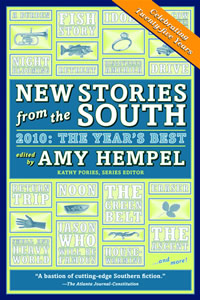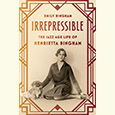Tell Me a Story of Deep Delight
Algonquin’s new collection inspires a troublesome question: is Southern literature going the way of the slamming screen door?
In her Chapter 16 review of the 2009 volume of New Stories from the South, Maria Browning notes that Southern literature must “be understood as something more than a collection of authors who have clocked time at a Southern university, or as a marketing gimmick that promises readers some echo of Faulkner or Welty.” If a distinctly Southern literature can survive in a post-agrarian age, she writes, it “will consist of stories rich with the details of its particular cities and its surviving countryside, stories that could spring up nowhere else.” Browning didn’t find much fiction fitting this description in New Stories from the South.
Familiar with the problem she addresses, I nevertheless tried to keep an open mind in reading the 2010 volume, edited by Amy Hempel. I kept an open mind with regard to Hempel’s own Yankee-by-way-of-the-Midwest background, even if some small part of me did twinge at the thought that a writer with no claim, not even a minor one, to the South had edited the anthology—the 25th anniversary volume, no less. (My openmindedness might have had something to do with my admiration for Hempel’s own writing.)
 Alas. Despite all this openmindedness, a nagging disappointment settled in after several stories. Once again, there is too little here that feels distinctly, or even faintly, Southern. In fact, the book opens with a story set in Naples—not the one in Florida—which, in a collection like this, is almost an affront. Hempel explains its inclusion (she feels she must, a red flag if ever there were one) this way: “The author, Adam Atlas, was born and raised in Louisville, Kentucky; in ‘New Year’s Weekend on the Hand Surgery Ward, Old Pilgrims’ Hospital, Naples, Italy,’ we learn that events in Kentucky propelled the narrator to flee not only his home but his homeland, and fetch up in Naples, teaching English.” Fair enough. But that background takes up only five lines in the narrative, and neither Louisville nor Kentucky are mentioned by name.
Alas. Despite all this openmindedness, a nagging disappointment settled in after several stories. Once again, there is too little here that feels distinctly, or even faintly, Southern. In fact, the book opens with a story set in Naples—not the one in Florida—which, in a collection like this, is almost an affront. Hempel explains its inclusion (she feels she must, a red flag if ever there were one) this way: “The author, Adam Atlas, was born and raised in Louisville, Kentucky; in ‘New Year’s Weekend on the Hand Surgery Ward, Old Pilgrims’ Hospital, Naples, Italy,’ we learn that events in Kentucky propelled the narrator to flee not only his home but his homeland, and fetch up in Naples, teaching English.” Fair enough. But that background takes up only five lines in the narrative, and neither Louisville nor Kentucky are mentioned by name.
Atlas’s narrative makes for an inauspicious, even perplexing, opening to New Stories from the South. For this well-established, one-of-a-kind anthology, surely, as Browning suggests, the writer’s residence or region of origin should be inconsequential compared to the story’s ability to evoke a strong sense of Southern place. It’s impossible not to feel a bit shortchanged, even though the collection consists, regional focus aside, of mainly strong, compelling stories, like Ashleigh Pedersen’s fascinating “Small and Heavy World,” or Brad Watson’s sobering “Noon”—to name two that have no particular Southern quality.
Fortunately, a fair number of inarguably Southern stories can be found in the 2010 New Stories from the South. The collection’s standout may be Tim Gautreaux’s “Idols,” a gripping tale of greed, cruelty, ignorance, failure, and conflagration in rural Mississippi. It tells the story of Julian, an arrogant, poor, delusional Memphis typewriter repairman who inherits a dilapidated mansion set way back off a gravel road and begins the impossible task of renovating it with virtually no budget. Barry Hannah would be proud. So would Flannery O’Connor, to whom the story was written somewhat in homage, as Gautreaux explains in his author’s note.
Or take Ann Pancake’s “Arsonists,” a tale of retired coal miners in a tiny West Virginia town, driven mad and robbed of their very homes by the foundation-shattering blasts of mountaintop-removal mining. It’s an important story of disempowered people in dire straits, the sort that makes you want to know more about what’s really going on “out there.” It never smells of agenda, yet has the power to change lives.
Some writers with Tennessee connections (this collection features four of them) put on a good regional show here, too. Elizabeth Spencer’s tale of family secrets and grudges, “Return Visit,” straddles the North Carolina mountains and Mississippi. One character notes “that to be funny you didn’t have to exaggerate, just tell the truth. He said it was one thing Mississippi people knew very well.”
And while the characters in “Housewarming,” by Kevin Wilson, a native Tennessean who teaches at the University of the South, could certainly reside anywhere, Wilson has set his narrative clearly in the contemporary South: you can see aging father Mackie and his hot-tempered son Jackson, who has come home to set up house with a new wife after years of misdoings, barreling down the interstates of Tennessee, North Carolina, Alabama, and Florida. Wilson makes sure we know where we are.
Earlier this year, in an essay for Chapter 16, Serenity Gerbman wrote of the problem of contemporary Southern literature: “It is true, after all, that a friend recently described to me a childhood pastime which involved ‘playing church,’ where the siblings argued over whose turn it was to preach and whose to be saved. A relative of mine attended a wedding reception not too long ago at which the centerpiece was a whole hog, smoking away in a homemade smoker on a trailer bed still hitched to the pick-up truck. When the owner got mad about something or other, he got in and drove away, pulling the smoking hog on the trailer behind him. (More potato salad, anyone?) These stories are true, and funny, and Southern. But they are also potential fodder for some bad Southern fiction.”
In skilled hands, of course, it is fodder for some good Southern fiction too!. (I, for one, would love to see Wells Tower take on that wedding reception.) In fact, it’s hard not to suspect that some contemporary fiction writers, carrying the burden of the region’s tremendous literary legacy on their backs, may resist the draw of distinctly Southern material in fear that it will come across as hackneyed, sweaty with nostalgia, or a puny caricature of one of the Southern greats. Or perhaps they simply reject it outright, desperate to avoid being pigeonholed as a Southern writer. These are all legitimate dangers, though such anxious avoidance may be holding too many writers back.
 I can’t shake the feeling that somewhere there is an untapped, or under-celebrated, wealth of stories about the contemporary South. It may suffer the nationwide blight of franchises and Wal-Marts, of cookie-cutter housing developments, but why would anyone think there are not distinctly Southern stories to be found within the cracks and crevices of this world? Or stories about the ongoing battle between preservationists and developers, about the small lives played out on that contested ground? (Lydia Peelle’s “Shadow on a Weary Land,” from her excellent collection Reasons and Advantages for Breathing, comes to mind.) Or stories about the burgeoning Latino communities in virtually every Southern state, the old suburbs where empty strip malls are becoming home to mercados?
I can’t shake the feeling that somewhere there is an untapped, or under-celebrated, wealth of stories about the contemporary South. It may suffer the nationwide blight of franchises and Wal-Marts, of cookie-cutter housing developments, but why would anyone think there are not distinctly Southern stories to be found within the cracks and crevices of this world? Or stories about the ongoing battle between preservationists and developers, about the small lives played out on that contested ground? (Lydia Peelle’s “Shadow on a Weary Land,” from her excellent collection Reasons and Advantages for Breathing, comes to mind.) Or stories about the burgeoning Latino communities in virtually every Southern state, the old suburbs where empty strip malls are becoming home to mercados?
There is a new-New South out there, and the opportunities for storytelling are ridiculously abundant. As Gerbman observes, “Writing about where you come from and why that matters is not dead and never will be. There is a truly great contemporary Southern novel coming, and it may be written by someone from Mexico, or Laos, or India. Cultural diversity is the untold story of the modern South, and that silence is shameful.”
Or, more simply, as Spencer puts it in a recent interview with Chapter 16, “As long as people live here in the South, I suppose they’re Southerners, and as long as they write about people living in the South, I suppose that’s Southern fiction.”
A suggestion to future editors of New Stories of the South: Be more radical. Be more narrow-minded, but less exclusive. Dig deeper into the work of obscure writers if you must. Make it a requirement that any story picked for the collection must include the words “South” or “Southern” or the name of a Southern state in any pithy summary of it.
It is a good thing, of course, that the many contemporary writers who call or have called the South home are writing stories that are in no shape or form regional, whose stories staunchly resist that classification. But if this anthology is to endure, to mean anything, let it return to Southern roots.


